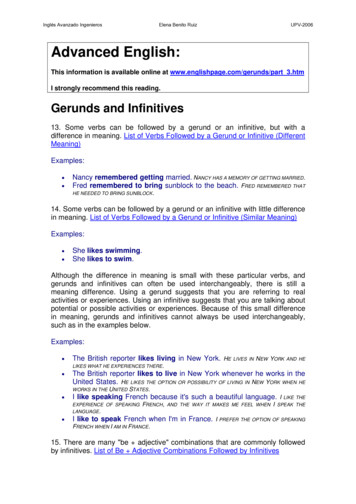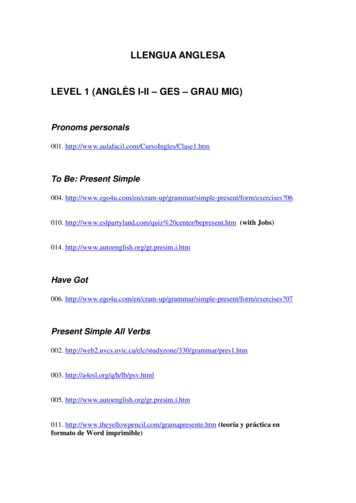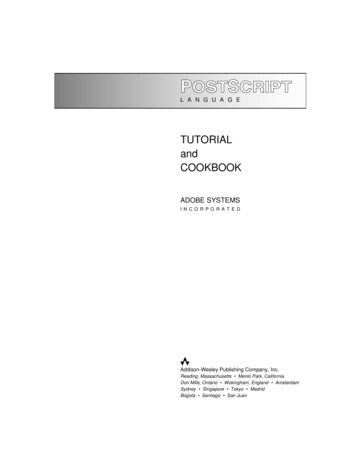
Transcription
June 2009Volume 13, Number 1EnglishPage.ComTitleEnglish PageAuthorLanguage DynamicsHomepagehttp://www.englishpage.com/Type of productEnglish learning websiteOverviewWith the consistently growing popularity and availability of the Internet, new computerassisted language learning (CALL) programs and web-enhanced courses are emergingconstantly. As a part of this trend, the number of websites related to learning English isexpanding exponentially, making it extremely difficult for users to make good choices.Principles are necessary to guide educators, learners, and other Internet users in theirsearch for reliable information and websites and to help them focus on the most relevantand valuable materials from the websites.Principles for developing review criteria should take into account learning theories, thecharacteristics of the content and learners' academic and social needs. English learningwebsites should observe not only the general design or evaluation principles to addresslearning development but also the specific ones to accomplish English learning objectives. Chapelle (2001) suggests that any proposed CALL program or web-enhancedcourse needs to be evaluated for its:(1) language learning potential;(2) learner fit;(3) meaning focus;(4) authenticity;(5) impact; and(6) practicality.Cummins, Brown and Sayers (2007) suggest inquiring whether or not the instruction:(1) provides cognitive challenge and opportunities for deep processing of meaning;(2) relates instruction to prior knowledge and experiences;TESL-EJ 13.1, June 2009 !EnglishPage.com/Yuan!!Page 1 of 11
(3) promotes active self-regulated collaborative inquiry;(4) promotes extensive reading and writing across the curriculum;(5) helps students develop strategies for effective reading, writing and learning; and(6) promotes affective involvement and identity investment.Since language learning is not just the acquisition of language knowledge and competence but also a process of developing cultural and social interaction and critical thinking, the principles for evaluating English learning websites should be designed to promote communication and situational learning. After reviewing different criteria for theevaluation of English learning websites, Yang and Chan (2008) show that "Englishlearning websites should organize the learning objectives based on the interaction of thefour language skills (listening, speaking, reading, and writing) and also provide learningopportunities for the semantic, pragmatic, and sociolinguistic usages" (p. 405).As discussed above, varying criteria can be considered in evaluating English learningwebsites. For the sake of synthesis and convenience, this review evaluates English Page,a popular English learning website, in terms of five criteria drawn from the above literature in accordance with English learners' academic and social needs:(1) language learning potential;(2) learner fit;(3) interactivity;(4) quality of resources; and(5) opportunities for language skills and learning strategies.General DescriptionAccording to the front page of the website, English Page (englishpage.com) was createdby Language Dynamics with the purpose of offering "free English lessons and ESL/EFLresources to intermediate and advanced English learners, typically well-educated business people and professionals, to improve their English for career advancement." With awide range of authentic pedagogical materials, it strives to implement online instructionof English as an alternative mode of teaching and learning and a substantial supplementto traditional teaching.From the home page of the website (Figure 1), the "eyeball" label of englishpage.comand the graphic of a few books stacked attract learners' attention to the concise themesof the website. They are characterized by English tutorials featuring interactive exercisesand resources ranging from grammar, vocabulary, reading, and listening to student forums and online dictionaries.TESL-EJ 13.1, June 2009 !EnglishPage.com/Yuan!!Page 2 of 11
Figure 1. Home PageOne of the features of English Page is an "English Grammar Book" (Figure 2). Unlike atypical electronic book, this grammar book has 156 links to the related grammar topicswithin and beyond English Page. Clicking the "Add a Site" button, learners can contribute to the website by adding an English lesson, exercise, or resource. From the "TopRated," learners can have a glimpse of the top ten resources rated by users. Furthermore, learners can find new links to the grammar book by clicking on "What's New."Learners who are only interested in specific grammar points can be easily led to the target with the help of the "search" function in the grammar book or within the website.TESL-EJ 13.1, June 2009 !EnglishPage.com/Yuan!!Page 3 of 11
Figure 2. English Grammar BookIt is worth noting that each category of grammar tutorial features quite a few exercises,exemplified in Figure 3. In addition, not only can learners go to any exercises before orafter each tutorial but also check the results using a "check" function.TESL-EJ 13.1, June 2009 !EnglishPage.com/Yuan!!Page 4 of 11
Figure 3. An Example Grammar ExerciseLike the grammar lessons, the vocabulary lessons on the site cover different categoriesof new words, from daily life to special fields like the aerospace industry, as shown inFigure 4.Figure 4. Vocabulary LessonsIn addition to exercises for each vocabulary lesson similar to the grammar lessons,learners can get more practice through a crossword puzzle (Figure 5).TESL-EJ 13.1, June 2009 !EnglishPage.com/Yuan!!Page 5 of 11
Figure 5. An Example Crossword PuzzleApart from English grammar and vocabulary lessons, the website offers an abundanceof English learning resources for listening, reading and dictionary use. In the "EnglishReading Room" (presented in Figure 6), learners can harness a huge collection of onlinemagazines, newspapers, and materials and resources from libraries. They can chooseany material of their interest. Online dictionaries like English-Foreign, English-Englishand Phrasal Verb dictionaries are conducive to understanding difficult words andphrases whose meanings may not be obtained from the context.TESL-EJ 13.1, June 2009 !EnglishPage.com/Yuan!!Page 6 of 11
Figure 6. English Reading RoomBy introducing learners to free online news, culture broadcasts, and online movies andradio (see Figure 7), English Page enables them to study English in situational settings.Figure 7. English Listening ResourcesFinally, English Page provides forums (Figure 8) as a platform for asynchronous socialinteraction. To enter the forums, learners are required to register before they can be involved in activities such as posting an English language question, participating in stuTESL-EJ 13.1, June 2009 !EnglishPage.com/Yuan!!Page 7 of 11
dent discussions about texts and exams, or exchanging views on any topic related tolearning English.Figure 8. Student ForumsEvaluationBased on the five criteria described previously, the potential effectiveness and shortcomings of English Page are as follows.1. Language learning potentialSurfing the website, learners can easily recognize that English Page mainly focuses onthe instruction of grammar and vocabulary skills and dictionary use, which are widelyconsidered to be the most basic and crucial components of language leaning. With thein-depth grammar and vocabulary tutorials featuring interactive exercises, not only canlearners work on the rule-governed aspects of language concurrently with the expansionof vocabulary, but also consolidate their potential for sustained growth in listening,speaking, reading and writing. In an objective manner, the properly constructed openended and multiple-choice cloze exercises can assess collocational knowledge of learners, which has been recognized as a crucial part of native speaker's communicative competence (Herbst, 1996). Moreover, the popular crossword puzzles successfully incorporate phonological awareness and letter-sound correspondence into word developmentand meaning construction. Ignoring different assumptions as to the effectiveness of dictionary use while reading, English Page suggests that looking up words may help learnTESL-EJ 13.1, June 2009 !EnglishPage.com/Yuan!!Page 8 of 11
ers build their receptive vocabulary and can increase the chances the word will be retained (Peters, 2007).On the other hand, in spite of the potential for language learning, without varying exercises and implementing interactive activities, English Page largely adopts a simply presented drill-and-practice approach to English learning, thereby fatiguing learners anddiminishing their affective involvement. The repeated open-ended and multiple-choicecloze exercises confine learners' acquisition of grammatical knowledge and vocabularyskills to the decoding level. To realize the great potential of grammar and vocabulary,learners need to apply them to contextualized activities such as reading and writing.Furthermore, since the website does not keep the results of exercises nor explain incorrect items, learners cannot track their progress and follow the specific areas where theyneed more practice.2. Learner fitGenerally, every website follows the design principle of being usable enough to attract asmany users as possible. English Page fits the needs of intermediate and advanced English learners to strengthen grammar knowledge and expand vocabulary, as well as getaccess to extensive reading and listening materials. It can be of interest to professionalsand businesspeople who would like to improve their English proficiency in common usage. They can decide their learning process, plan their learning, monitor the learningtask, and check how well they have learnt. Thanks to the convenient search functions,learners can directly reach and manipulate any materials they want to learn from withinand beyond the website. As for learners aiming to become proficient at academic language, the repeated gap fill drills of grammar and vocabulary may not facilitate the integrative and complex practice of reading and writing they need.3. Multidimensional interactionLanguage learning is supposed to endow learners with language knowledge and communicative competence. English Page allows its users to participate in the developmentof the website by adding new links to its grammar book, rating the quality of the resources, and giving feedback to the web page developers. Thus, learners may promotetheir affective involvement in social practice. Besides, the website provides learners withforums as a platform for social interaction, which can have a positive impact on learners'achievement, interest, and motivation. With some raising the threads and others givingresponses, learners may experience the spirit of peer and collaborative learning. Contributing to the forum discussions, learners can enjoy the opportunities to expand theirknowledge and improve their critical thinking. Considering the significance of oral English, it is a pity that learners do not have access to audio interaction in English Page.4. Authentic resourcesIn addition to the tutorials and exercises within the website, learners can benefit muchfrom other free resources beyond English Page. With links to the resources within andbeyond English Page, learners can embrace extensive online situational and practicalTESL-EJ 13.1, June 2009 !EnglishPage.com/Yuan!!Page 9 of 11
resources for reading and listening comprehension and online dictionaries. The authentic resources can invoke and build on learner's prior knowledge and promote active andself-regulated learning. When learners can make free choices as to learning contents andcontrol the pace of the lesson, satisfaction and engagement improve. Nevertheless,without any guidance for the use of resources, some learners may not benefit from themas much as English Page expects. Sometimes, learners may be discouraged from navigating away from the website to linked materials of interest to them because of theheavy number of clicks involved.5. Opportunities for language skills and learning strategiesEnglish instruction is generally aimed at the development of multiple language skills inlistening, speaking, reading and writing. English Page has strived to meet the objectiveof helping learners to build a solid and essential foundation by providing them with anabundance of grammar and vocabulary knowledge and access to extensive reading andlistening resources and online dictionaries. Through the links of the categories such as"Nouns" and "Gerunds and infinitives" in the "English Grammar Book," the website enables learners ultimately to reach pages for the guidance and training in these aspects ofEnglish writing.However, with its emphasis on the decoding skills of English vocabulary and grammar,English Page does not provide learners enough opportunities either for learning strategies or for language skills to help learners to foster their comprehensive English learning. Although the website offers links to an abundance of resources for English listeningand reading, it does not give learners explicit instruction as to how to make use of themto improve their English learning. Despite links to writing practices, no systematic writing instruction or resources are available for learners. In addition, by lacking instructionor resources for speaking, the website fails to help learners with oral proficiency. Because of these deficiencies in some areas, learners cannot benefit from the interaction ofthe four language skills nor develop learning strategies such as inference, synthesis, andevaluation. The simply presented exercises of grammar and vocabulary can limit learners' opportunities to engage in cognitive challenges and the deep processing of meaning.To help learners to develop strategies for effective reading, writing and learning, EnglishPage needs to offer more integrated instruction of the four language skills to en
From the home page of the website (Figure 1), the "eyeball" label of englishpage.com and the graphic of a few books stacked attract learners' attention to the concise themes of the website. They are characterized by English tutorials featuring interactive exercises and resources ranging from grammar, vocabulary, reading, and listening to student fo- rums and online dictionaries. TESL-EJ 13.1 .File Size: 1MBPage Count: 11




